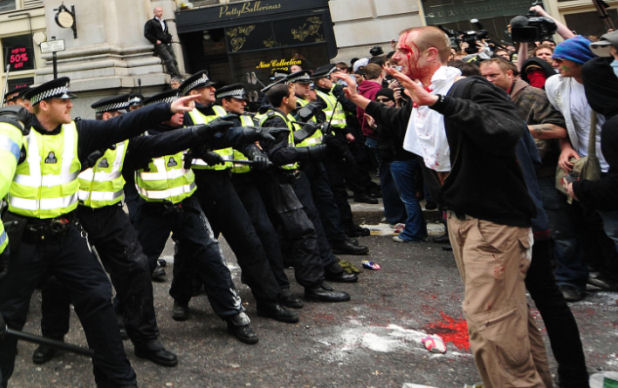
<Image - G20-London-Protest by Room1834 http://www.flickr.com/photos/0742/3405203655/>
There are so many lessons, pointers, revelations, areas of concern and epiphanies from the G20 protests that blogging about them seems almost superfluous. But to add to the comment mountain, here are my thoughts.
Social vs Traditional media
I listened and watched the coverage on the BBC and Sky, while simultaneously tracking events on twitter and Flickr. At the time the traditional coverage seemed biased against the protestors. Traditional media needs to go after a 'story', a narrative it can use to conveniently bundle events together, and it had decided crowd trouble would be that story. Some of the commentators on the traditional media bordered on the offensive - one business expert bemoaned that the protestors won't achieve anything and it will inconvenience people working in the city. Inconvenience? Bloody inconvenience them? Their behaviour has done far more than 'inconvenience' the rest of us.
Over on Twitter the picture was much more of aggressive tactics from the police and of protestors being penned in. This is just as biased in its way, but what it revealed was that 'the story' emerges from the stream, it isn't determined (or worse, predetermined) by a few.
Subsequently it turns out that the real story, or at least the 'feel' was better conveyed by social media than traditional media.
Policing and accountability
I think it is very easy to portray it as protestors = good, police = bad in this scenario but that is naive and simplistic. It was obvious to me that we would have some such accounts of police brutality at the event by watching the twitter stream where the general sense was of antagonism towards protestors. This should be no suprise really - prior to the demonstrations the police had been told to expect violence, by police chiefs, but also by various protest groups. It had been set up for the police and protestors as a conflict situation - if you come into any situation expecting that, then you will interpret actions accordingly.
The key then is not a review of police practice so much, but a review how the protest was represented to the police. Senior officers could have pitched it along the lines of 'Our job is to help these people protest safely. They're angry at what has happened and to be honest, we know how they feel, so help them demonstrate, but any signs of trouble and we'll stamp it out quickly.' That creates a different mindset and relationship with the protestors.
I also wonder if the police send in officers, or use trusted people, to report back to them on what the experience was like from the other side? A sort of customer review. And then to have these people come and brief officers prior to demonstrations. Does anyone know if they do this? One of the issues seems to be that some police have stopped viewing protestors as people with whom they have any connection, and vice versa.
Counter-terrorism
The danger for the police is that we are seeing a politicization of policing last realised during the 1980s. This is largely a result of many of the counter-terrorism laws, which themselves have become political vehicles for maintaining control over the general populace. I'm not particularly radical (you've guessed that eh?), and when many of the laws were introduced I didn't really see how they would affect me. But as John Naughton points out the manner in which photography is now regarded as an illegal or subversive act does not reflect the type of society we expect in the UK.
It is not the groups who always mistrust the police that are a concern, it is when they lose the trust of the general population that problems arise. It makes all aspects of their job much more difficult, and ultimately that isn't good for any of us. If the police become divorced from the general public, and seen more as servants of large businesses and politicians, it will take a very long time, a lot of community inititiatives and lots of money to rebuild that trust, so my advice would be to stop and reconsider their role now.
Policing of demonstrations is now often under the guise of anti-terrorism which gives the police powers to do pretty much what they like. This is tempting - why be constrained when you can be free to do what you want? But they should resist the temptation to go to the anti-terror well too often. Trust in the police had been on the increase, and this after a lot of genuine hard work. Here's a simple rule they should bear in mind, adapted from running:
- Trust is like muscle - it is hard to get and easy to lose.
- Suspicion is like fat - it is easy to get and hard to lose.
Surveillance
After years of being watched and monitored tables are now being turned. Without the video evidence would there have been any enquiry about Ian Tomlinson? And like DRM, trying to control the use of video and photography is an ultimately doomed enterprise - it's too easy, to ubiquitous and too quickly disseminated. Paul Carr has a good piece on this, and how we'll all have to learn to accept there's no such thing as private any more, and why this may not be a bad thing.
So, overall what is all about? Technology and Trust, and the changing relationship between the two. We will have a new relationship with trust because technology demands it.





